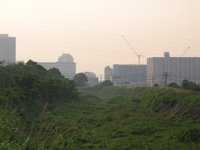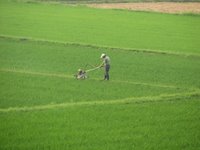Week of July 4th



These are a few pictures that I took of the greater Kusatsu area. The top one is typical scene. In the river valleys between mountains farmers plant galaxies of rice fields. Irrigation channels do the majority of the work, however sometimes I see one lone sexagenarian tending to twenty football fields of rice plants. I tried to capture the unobtrusive quietude of this one man I saw in the midst of his zen-like duties. I know its an idyllic trifle of nostalgia, but I really feel his responsibility and respect for the soil while he is nurturing the earth into fruition. I can imagine his unquestioning simplicity that strives only to produce nourishment without destroying in the process. I wonder why humans think it more natural to pervert this process with technology. Why do we insist on challenging and interrupting a cycle of nature and growth that is older and more resolute than our minds can fathom? The divine fallacy that humans imagine of themselves, the belief of necessity by power that they use in order to elevate and ensky themselves above the earth and natural processes (as well as each other), is in my opinion the most dangerous and delusional of human creations. Believing that we were made in God's image seems to inflate people with the assumption that what we do is right because we do it righteously, or worse, by necessity. Our means of justification and rationalization appear to be more akin to ego-defenses to sweep away dissonances that arise when we realize the way we live now contradicts the way the universe and earth works. It's a scary thing when we make these decisions to choose ignorance on our own, but when our (US) government simultaneously withholds truths about global warming from citizens, how are we supposed to make well-informed opinions and conclusions in the presence of groupthink and deception?
The second photo serves as a contrast to the first. This is downtown Kusatsu from an elevated position on the Old Kusatsu River (Kawa). As you can see development here moves at a fairly impressive rate. The city has roughly the same population of Athens (a handful over 100,000 residents), it just grows up rather than out. I'm thankful to see such conscientious use of urban development. It leaves more space and land for nature. If you enlarge this image though, you can see a large icon in the center with two doves on it––one green, one white. This is the climaxing of human culture, the advertisement. Nearly every city center in Shiga-ken (prefecture) bears Cain's stain of industry and money. It is the Wal-Mart of Japan with everything you could want from clothes to food to books to houseware (surprise, surprise, I'm steering clear). I want to present this iconography to balance the view. I don't want to purport the infallibility of Japanese life. It is subject to the same avarice and greed of capitalism as America. But I'm honestly hoping the more traditional and deferent attitude toward nature will prevail.
An example of this is my third photograph. It's an example of subsistence farming still taking place in some of the fields about ten minutes from our apartment. Older men and women only need to take a short drive to their own private garden where they can reap vegetables and fruits for their daily use. Tomatoes and onions are especially abundant right now; in the winter cabbage and daikon (giant white radish). Year round these people labor to produce for their families, selling whatever else they have at a local co-op or farmer's market on the weekends.
I wonder if when this generation of grandparents passes away, will their children continue the legacy? From what I see in the future retirees, I do not predict a whole-hearted maintenance of this tradition. How will people who have spent their entire lives in offices suddenly transition to agricultural observers? They will make historically bad golfers, gamblers, and alcoholics, but outside of that, what will they accomplish? One of my favorite quotations is the closing note of Voltaire's Candide: "We must cultivate our gardens." No doubt this is metaphorical for establishing a place within ourselves that can blossom so that we can accept life's cataclysms with grace and sanity. I guess I see this maxim being ignored and avoided on a literal as well as a cultural level in our contemporary global society. We outsource for expediency and cheap products. We do not want to take responsibility for the worldwide strife our privileges cost. I am proposing that maybe if we afforded a bit insight into ourselves, our needs and the ego-defenses we manifest and the impact these have on the world, we could feed a more reciprocative and harmonious vine. Maybe we could use the earth to our advantage in farming rather than contaminate it with poisonous fertilizers, GM hormones, pesticides––all of which damage our crops in the long run. Otherwise we will pay for our literal and mental shortcuts.
I want to add finally that while these ideas may be a bit weighty and epiphany-laden for only having been in Japan for one month, they are ideas that have been incubating for years. I think it took a change of scenery to release some of them in words that I felt were appropriate. Sometimes in the past I have spouted-off and rambled about these issues like a rabid animal with bloodshot eyes and a foaming mouth. It's much easier to talk about these things at a safe distance I suppose. Well, that's enough. Peace.

0 Comments:
Post a Comment
<< Home